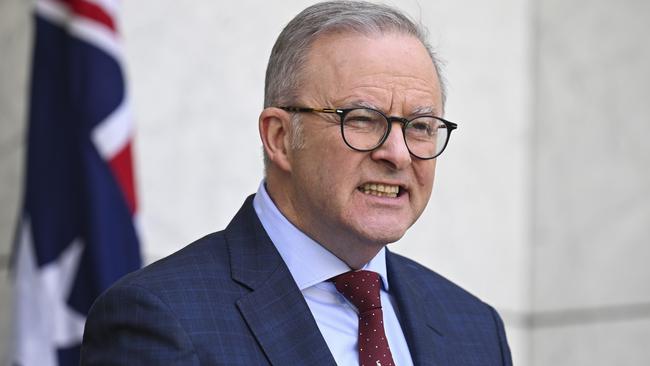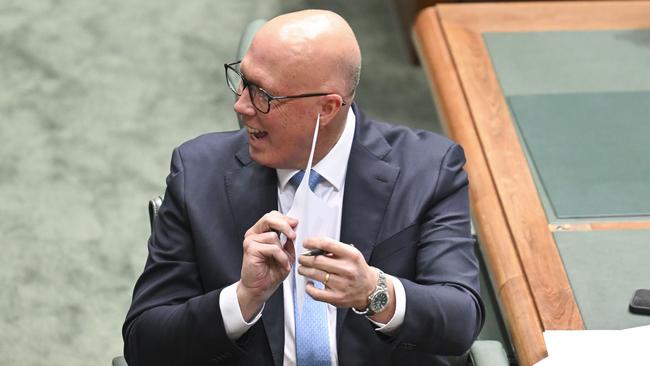Peter Dutton can win but odds are still on Anthony Albanese to win Australia’s next federal election | Samantha Maiden
Can Peter Dutton win the next federal for the Coalition? It might not work out the way you think it will, writes Samantha Maiden.
Leaders
Don't miss out on the headlines from Leaders. Followed categories will be added to My News.
Just how much trouble is Anthony Albanese in when it comes to the question of winning the next election?
Depending on who you talk to in Labor ranks, the answer is more trouble that the Prime Minister would have his colleagues believe.
But there’s also reasons not to over-inflate the prospects of Peter Dutton winning the next election, which all boil down to the sheer number of seats he would need to win to form government.
Is it possible Peter Dutton can win? Of course.
Is it harder for Peter Dutton to win government than it is for Mr Albanese to hang on? Affirmative.
To understand why it’s worth unpacking the numbers as they stand in Parliament.
Right now, Labor governs with 78 MPs. Hardly a landslide, but a majority nonetheless.
TELL US MORE IN THE COMMENTS
That’s Anthony Albanese’s first hurdle - he doesn’t have a big buffer. Labor went backwards during the 2022 campaign.
Has he learned from his experience and can he do better? That remains unknown.
The Liberal-National Party has only 55 MPs. That’s Peter Dutton’s hurdle and it’s a big one.
He started with 58 seats in 2022, before the Liberals lost Aston in Victoria and two MPs went to the crossbench. So arguably they are still notionally on 57 seats but technically it’s 55.
The House of Representatives has 151 seats.
Thus, to win government in their own right, Peter Dutton needs to get from 55 MPs to 76, unless he can get to 71 or 72 seats for example and govern with independents. That’s a huge haul of seats.
Despite Newspoll’s prediction that if any election was held today that vote would fall 51:49 in Peter Dutton’s favour, most experts will tell you that’s not enough to win government.
If that sounds counter-intuitive, consider this.
If for argument’s sake a 51:49 result was applied as a uniform swing he might hope to pick up around 10 seats. That’s not enough to form a government.

The question is whether the trend of erosion in the Labor vote continues and if Anthony Albanese again performs poorly in the campaign.
Under that scenario, Peter Dutton could push that 10 seat prediction up to 15 or so then he’s in the ballgame of forming a minority government with more centre-leaning independents.
This might include South Australia’s Rebekah Sharkie, the Katter party’s Bob Katter and NSW Independent Dai Le, for example.
Teal independents Allegra Spender and WA’s Kate Cheney are possibles. The more left-leaning teal independents in Victoria seem less likely prospects.
But on any measure, Mr Dutton needs to secure around 20 seats to comfortably form government or 15 plus to form a minority government.
The ongoing waiting game over interest rates is a huge factor. The PM needed one this week but the RBA isn’t in a hurry.
It remains possible he will have to face the polls without an interest rate cut which would be a political disaster.
Anthony Albanese faces huge economic pressures over the cost of living and housing.
He’s thrown plenty at those issues but so far nothing that has stuck or inspired the electorate. He was also a poor campaigner at the last election.
But as frustrated as voters clearly are with Anthony Albanese after his frolic buying retirement homes in Copacabana, NSW and enjoying decades of upgrades on Qantas flights, one-term government remains rare in Australia.

To find the last one-term federal government in Australia you need to go all the way back to 1931, when Labor’s James Scullin lost the election.
The Whitlam Government was sacked in 1975 after it was elected in 1972 and re-elected in 1974 - technically not a one-term government although it was a brief tenure.
So rare, but not impossible.
Labor frontbencher Chris Bowen himself observed this in May, 2010, in what we know now was the final weeks of Kevin Rudd’s first term as Prime Minister before he was rolled by Julia Gillard.
“Now, many people think there’s a historical rule in Australia that first term Governments aren’t defeated,’’ he said.
“I don’t accept that. It’s a historical accident that it hasn’t happened for a long time, but many first term Governments have come close. It’s easy to forget now just how, frankly, fraught John Howard’s first term was and he ended up losing the popular vote and came very close to losing office the first time around.”
This is also a truism: governments seeking a second term lose votes
Consider the record of Labor prime ministers (Gough Whitlam, 1974; Bob Hawke, 1984; Julia Gillard, 2010), and Liberal prime ministers (Robert Menzies, 1951; Malcolm Fraser, 1977; John Howard, 1998; Malcolm Turnbull, 2016).
The government’s two-party vote went backwards every time.
Labor’s two-party vote declined by 3.6 points when Julia Gillard ran in the 2010 election. In 2022, when Scott Morrison sought a second term (the Liberal Party itself obviously held power from 2013-2022) the Coalition’s two-party vote declined by 3.3 points.
That’s good news for Peter Dutton and the Liberal Party. It’s highly unlikely the Liberals will do worse than they did in 2022 and it’s highly unlikely that the Prime Minister will do better.
The conventional wisdom has long been that if the current polls are correct Labor will be returned to govern but likely to be pushed into minority government and forced to rely on independents.
That remains the most likely outcome, but it does not rule out Peter Dutton pulling off a surprise victory if things continue to go his way.
More Coverage
Originally published as Peter Dutton can win but odds are still on Anthony Albanese to win Australia’s next federal election | Samantha Maiden






